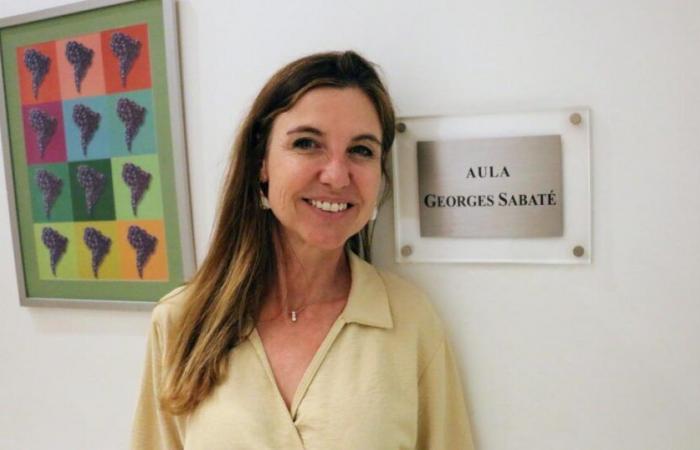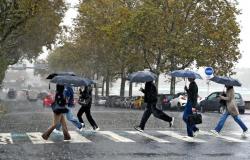PORTRAIT – 25 years ago, Marina Beltrame created the country’s first sommelier school, with the support of a French entrepreneur, who had anticipated like few others the potential of this distant market. Since then, in Buenos Aires, generations of sommeliers have succeeded one another and have maintained the preponderant role of women.
We are at the end of the last century, in the restaurant of a hotel in micro center from Buenos Aires. Argentina is experiencing its decade of economic liberalization. The country has become an Eldorado for foreign investors. Sitting at one of the tables, a customer with great confidence attracts attention, with his accent, both French and Spanish, and the thick smoke of his cigar. This client, the Frenchman Georges Sabaté, leader in cork stoppers, finds himself in the middle of a conversation with the great sommelier Jean Frambourt. One of the restaurant waitresses shuffles around their table. Sabaté calls out to him, saying approximately these words: “I can see that our conversations interest you. Do you want to work in wine? So go and train in France.”.
The waitress, Marina Beltrame, is disconcerted by what turns out to be a proposition, as concrete as it is unexpected. She accepted and found herself, in September 1996, at the Paris School of Table Trades (EPMT), from which she graduated three years later. “Georges swore to me that I would be on a scholarshiprembobine-t-elle. It was a condition for me, because I did not have the means to pay for this training. After a few months of lessons, I wanted to thank the director of the establishment, who was none other than Jean Frambourt. I went to his office and when I mentioned the stock market to him, he burst out laughing. It was Georges who covered my tuition fees.”
“Argentina is a very atypical case”
This spontaneous act of patronage was also the gamble of a visionary entrepreneur, who had sensed the potential of Argentine grapes before anyone else. The industry would need flavor interpreters, capable of bringing about the encounter between the product and the consumer. Patrick Sabaté, son of Georges, summarizes the role of his father and the family business in the development of this new world wine industry: “Argentina is a very atypical case. This is a country which had a certain wine-growing tradition, but whose industry was, in the 1990s, at an embryonic stage. My father had the excellent idea of creating an economic interest group (EIG) which put all French know-how at the service of Argentine wine. We cork makers brought the corks. There were coopers, vat makers, cold makers, presses… The first large cellars were built. Large foreign industries invested and the machine got underway!”
For all of this to work, sommeliers were needed. Upon returning from Paris in 1999, Marina inaugurated the country’s first school, the Argentine School of Sommeliers (EAS), under the leadership of her French patron. “The development of the industry was achieved thanks to the symbiosis between finance, oenology, production and sommelier”continues Patrick Sabaté, who elevates sommeliers to the rank of “pontiffs”that’s to say “people who literally create a bridge between the consumer and the winemaker”.
DR
A quarter of a century has passed since this meeting which changed her life and Marina is still grateful to the Sabatés, without whom she would not have been able to introduce this profession. The members of this industrial family, originally from the Pyrénées-Orientales, were the first people mentioned in Marina’s speech at the end of November, during the 25th anniversary of the EAS, in the sumptuous setting of the golden salon of the Teatro Colón, in Buenos Aires. “There was a time when a few waiters were specialists in wine presentation, in the most exclusive restaurants of Buenos Airesexplains Flavia Rizzuto, co-founder of the Argentine Wine and Spirits Center (CAVE, in Spanish). However, at that time, in the 1960s, we were not yet talking about sommeliers in our country. It was Marina who, upon her return from France, set the subject in Argentina.”
Also read
“A rock star in Argentina”: Michel Rolland, this Frenchman who saved Argentinian Malbec
The success of her school led Marina Beltrame to export the model to several Latin American countries (Panama, Costa Rica, Brazil, Colombia, Peru). Even more striking: it was she who opened the way for a whole generation of sommeliers. Women who, since the appearance of this profession on the banks of the La Plata river, have remained in the majority. This is demonstrated by the national competitions, organized by the Argentine Association of Sommeliers (AAS). Since the first competition, in 2002, which dedicated Flavia Rizzuto, only one man has been able to win.






